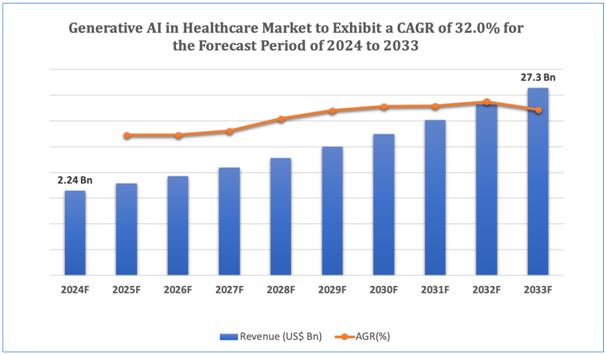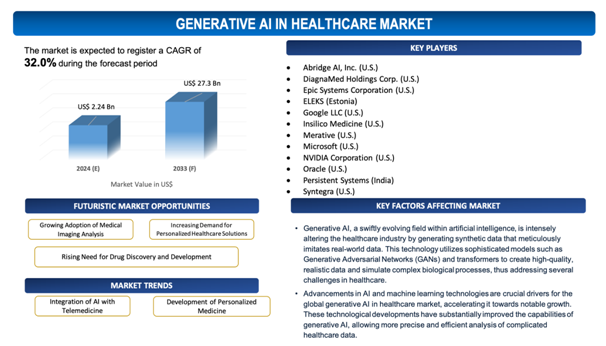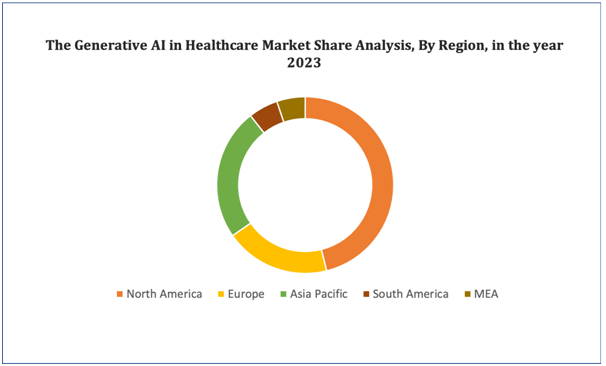Generative AI in Healthcare Market Overview
The global generative AI in healthcare market is estimated to be worth over USD 27.3Bn in 2033 and is expected to grow at CAGR of 32.0% during the forecast period (2024-2033).
Generative AI, a swiftlyevolving field within artificial intelligence, is intenselyaltering the healthcare industry by generating synthetic data that meticulouslyimitates real-world data. This technology utilizes sophisticated models such as Generative Adversarial Networks (GANs) and transformers to create high-quality, realistic data and simulate complex biological processes, thus addressing several challenges in healthcare.
One of the most prominent applications of generative AI in healthcare is in medical imaging. Generative AI can improve the resolution and quality of medical images, which is critical for precise diagnosis and treatment planning. It also creates synthetic medical images for rare diseases, offering valuable datasets for training medical professionals and enhancing diagnostic algorithms. This capability is specificallyimportant in enhancing the early detection of conditions like cancer, where high-quality imaging can make a life-restoring difference.
In drug discovery, generative AI propels the process by simulating molecular interactions and forecasting the safety and efficacy of new compounds. This minimizes the time and cost related to bringing new drugs to market. For instance, AI models can generate potential drug candidates and optimize them for improved performance, aligning the research and development pipeline. This capability to swiftly generate and test hypotheses at scale is transforming pharmaceutical research.
Generative AI also holds a crucial role in personalized medicine. By evaluating vast amounts of genetic information and patient data, AI can indicate highly personalized treatment plans. This personalized approach not only enhances treatment efficiency but also mitigatesside effects, as therapies are tailored to the individual's unique genetic makeup and health profile.
Moreover, generative AI enhances patient care through virtual health assistants, which provide continuous support, manage chronic conditions, and offer timely health advice. These AI-driven assistants can monitor patient health in real-time, alerting healthcare providers to potential issues before they become serious, thus enabling preventive care.
In the realm of data privacy, generative AI creates synthetic health records that maintain patient confidentiality while still being useful for research purposes. This synthetic data enables researchers to access extensive datasets without compromising patient privacy, fostering innovation and the development of new medical treatments and interventions.
By and large, the incorporation of generative AI in healthcare is ushering in a new era of medical practice. By improving the accuracy of diagnoses, facilitating drug discovery, customizing treatment plans, and enhancing patient care, generative AI is making healthcare more effective, efficient, and patient-centered. Since the technology continues to evolve, its potential to further revolutionize the healthcare landscape and enhance patient outcomes is immense.
Figure 1. Generative AI in Healthcare: Market Size

Get more details on this report - Request Free Sample
Key Market Insights
The global generative AI in healthcare market is witnessingswift growth, fuelled by advancements in AI technology and growing demand for personalized medicine and efficient healthcare solutions. Key market insights exhibit a substantialsurge in investments from both public and private sectors, emphasized at integrating AI-driven innovations into healthcare systems. Significant developments comprise the deployment of AI-enhanced medical imaging tools that enhance diagnostic precision and the use of generative models in drug discovery to propel the development of new therapeutics. Novel technologies such as GANs are being utilized to generate synthetic medical images and data, supporting better training for healthcare professionals and improving machine learning model performance. In addition, AI-powered virtual health assistants are becoming increasingly sophisticated, providing real-time patient monitoring and support. Major companies in this space, comprisingGoogle Health,IBM, and Microsoft, are accelerating innovation with notable research and development efforts. The market panorama is also marked by strategic collaborations between tech giants and healthcare providers, aiming to harness AI's potential to enhance patient outcomes and streamline healthcare operations. As regulatory frameworks evolve to better adapt these technologies, the generative AI in healthcare market is poised for sustained expansion and revolutionary impact.
Market Dynamics
Market Drivers
Advancements in AI and Machine Learning Technologies
Advancements in AI and machine learning technologies are crucial drivers for the global generative AI in healthcare market, accelerating it towards notable growth. These technological developments have substatiallyimproved the capabilities of generative AI, allowing more precise and efficient analysis of complicated healthcare data. Machine learning algorithms, specifically deep learning models like GANs and transformers, have transformed the way medical images are processed, resulting in more precise diagnostics and early detection of diseases. In addition, the capacity of AI to generate synthetic data is critical in overcoming the limitations of real-world medical datasets, promoting robust training of predictive models without compromising patient privacy. These progressions also streamline drug discovery by simulating molecular interactions and predicting the efficiency of potential treatments, thusminimizing time and costs related toconventional R&D. Improved computational power and enhanced algorithmic efficiency have made these AI-driven processes faster and more reliable, fostering higher trust and adoption in the healthcare sector. Along with that, persistent improvements in AI technology have expanded its applications, from personalized medicine to real-time patient monitoring and virtual health assistants. As AI and machine learning technologies advance, they fuelefficiency and innovation in healthcare, making generative AI an essential tool in modern medical practice.
Market Restraints
With regard to numerous advantages of Generative AI in Healthcare, the market faces several challenges due to the unique characteristics and requirements associated with these potent pharmaceutical products. Some of the key market challenges include:
- Data Privacy and Security Concerns: The use of generative AI in healthcare includesmanagingextensive amounts of sensitive patient data. Ensuring the privacy and security of this data is a considerable challenge. Strict regulatory requirements, such as GDPR in Europe and HIPAA in the United States, requires robust data protection measures. Breaches or misuse of patient data can result inserious legal and financial reverbations, as well as loss of trust from patients and healthcare providers. These concerns can hinder the adoption and integration of generative AI technologies in the healthcare sector.
- High Implementation Costs and Technical Complexity: Deploying generative AI solutions in healthcare necessitatessignificant investment in advanced hardware, software, and specialized personnel. The high initial costs related to implementing these technologies can be a hindrance for several healthcare organizations, specifcally smaller clinics and hospitals with limited budgets. In addition, the technical intricacy of integrating AI systems with existing healthcare infrastructure demands significant expertise and ongoing maintenance, which can impede resources and hamper widespread adoption.

Get more details on this report - Request Free Sample
Market Opportunity
Growing Adoption of Medical Imaging Analysis
The soaring adoption of medical imaging analysis portrays a substantial market opportunity for generative AI in the healthcare sector. Medical imaging is crucial for precise diagnosis and treatment planning, but it conventionallydepends on time-consuming and error-prone manual interpretation. Generative AI can revolutionize this process by improving image quality, computerizing image analysis, and detecting anomalies with high precision. Advanced AI algorithms, such as GANs, can generate high-resolution synthetic images, supporting better training of diagnostic models and allowing radiologists to determine diseases at earlier stages. This ability is specifically valuable in fields like cardiology, oncology, and neurology, where early detection is critical for successful treatment outcomes.
The integration of AI in imaging analysis also addresses the soaring demand for medical imaging services, fuelled by an aging population and growing prevalence of chronic diseases. By enhancing the accuracy and efficiency of image interpretation, generative AI minimizes the workload on healthcare professionals and curtails the time needed for diagnosis, ultimately improving patient care. In addition to that, AI-driven imaging solutions can be deployed in underserved areas, where access to skilled radiologists is limited, thus broadening the reach of high-quality diagnostic services. As healthcare providers identify the benefits of AI-enhanced medical imaging, the adoption of generative AI technologies is estimated to propel, fueling market growth and innovation.
Market Trends
- Integration of AI with Telemedicine: The integration of generative AI with telemedicine platforms is a soaring trend in the healthcare market. As telemedicine becomes increasingly prevalent, specifically post-pandemic, the incorporation of AI enhances remote diagnostic capabilities. AI-driven tools can assess patient data, medical images, and even conduct virtual health assessments, offering real-time insights and recommendations. This trend not only enhances the efficiency and accuracy of telehealth services but also expands access to high-quality care in remote and underserved areas, making healthcare more inclusive and effective.
- Development of Personalized Medicine: The move towards personalized medicine is another notable trend fuelled by generative AI. AI technologies are increasingly being used to analyse vast amounts of genetic, clinical, and lifestyle data to personalize individualized treatment plans. Generative AI models can simulate patient-specific responses to different treatments, predict potential adverse effects, and suggest optimal therapeutic strategies. This personalized approach improves treatment efficiency and patient outcomes, mitigating trial-and-error in medical prescriptions. The trend towards personalized medicine is fostering a more precise, patient-centered approach in healthcare, underscoring the transformative potential of generative AI in delivering customized healthcare solutions.
Generative AI in Healthcare Market: Key Segments
By Application
- Personalized Treatment
- Patient Assistance
- Patient Monitoring and Predictive Analytics
- Medical Image Analysis and Diagnostics
- Drug Discovery and Development
By End user
- Hospitals
- Specialty Clinics
- Ambulatory Surgical Centers (ASCs)
- Research and Academic Institutes
- Others
By Key Geographical Regions
- North America
- Europe
- Asia-Pacific
- Middle East and Africa
- South America
Figure 4. Generative AI in Healthcare Market: Distribution by Region

Get more details on this report - Request Free Sample
Generative AI in Healthcare Market: Regional Analysis
North America region dominates the global generative AI in healthcare market owing to the increasing adoption of AI in healthcare, the presence of major market players and greater technological advancement in the region.Asia-Pacific region is estimated to observe significant amount of growth in the global generative AI in healthcare market owing to the swiftneed for telemedicine and healthcare support. In addition, the modernization and development in telecommunication is further estimated to accelerate the growth of the global generative AI in healthcare market in the region in the coming years.
Leading Generative AI in Healthcare Developers
Industry Trends and Global Forecasts, 2023-2035 report features an extensive study of the current market landscape, market size and future opportunities associated with the Generative AI in Healthcaremarket, during the given forecast period. Further, the market report highlights the efforts of several stakeholders engaged in this rapidly emerging segment of the biopharmaceutical industry. Key takeaways of the Generative AI in Healthcaremarket are briefly discussed below.
The report includes the list of players operating in the global Generative AI in Healthcare market. Some of the key players include:
- Abridge AI, Inc. (U.S.)
- DiagnaMed Holdings Corp. (U.S.)
- Epic Systems Corporation (U.S.)
- ELEKS (Estonia)
- Google LLC (U.S.)
- Insilico Medicine (U.S.)
- Merative (U.S.)
- Microsoft (U.S.)
- NVIDIA Corporation (U.S.)
- Oracle (U.S.)
- Persistent Systems (India)
- Syntegra (U.S.)
Generative AI in Healthcare Market: Key Developments
- In December 2023, Merck introduced Aiddison, a pioneering software-as-a-service for drug discovery. This platform integrated a virtual design and manufacturability through Synthia retrosynthesis software application programming interface (API) integration. The launch aimed to expedite drug development with the ability to speed up to about 70% process compared to traditional process.
- In August 2023, Cognizant expanded collaboration with Google Cloud, utilizing generative AI to enhance administrative processes, aiming for cost optimization and improved user experiences. This collaborative partnership aimed to strengthen the healthcare solutions, improved business efficiencies, and enhanced user experiences.
Scope of the Report
The market report presents an in-depth analysis of the various firms / organizations that are engaged in this market, across different segments, as defined in the below table:
|
Key Report Attributes |
Details |
|
Base Year |
2023 |
|
Forecast Period |
2024-2033 |
|
CAGR (2024-2033) |
32.0% |
|
Application |
|
|
End User |
|
|
Key Geographical Regions |
|
|
Key Companies Profiled |
|
